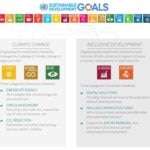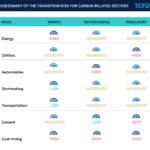BBVA updates its report on its progress on the climate change strategy (TCFD)
BBVA has published an update of its report on the risks and opportunities of climate change in accordance with the Task Force Climate-related Financial Disclosure (TCFD) standard, with data as of December 2020. This report reflects BBVA's progress in sustainability. Since its first publication in October 2020, it has already incorporated climate risk into the management of all the bank's businesses and its commitment to accompany customers towards a more sustainable future.

"The presentation of the TCFD report is another milestone in our commitment to sustainability. An exercise in transparency that reflects the bank’s progress in it’ governance model, strategy, risk management and metrics related to climate change", explains BBVA Chairman, Carlos Torres Vila, in the introduction to the report, where he also stresses that "the Net Zero 2050 commitment is a very important milestone in our sustainability strategy".
A few months before the COP 26 in Glasgow, BBVA updated this report, which also includes its efforts to involve its stakeholders and the direct impact of the bank's activity on the environment. Promoting the development of sustainable solutions is another key line of work underscored in this report. To this end, opportunities are identified in order to develop sustainable products and offer advice for individual and corporate clients.
In a single document, BBVA’s TCFD report also includes the main milestones in the bank’s commitment to sustainability – a journey that began in 2002 when BBVA joined the United Nations Global Compact and later adopted the Equator Principles in 2004. In 2007, BBVA first supported sustainable finance, participating in the European Investment Bank’s (EIB) issuing of a green bond. In 2008, the pension plan for Spanish employees was the first to subscribe to the Principles for Responsible Investment. A decade later, the bank presented its Pledge 2025 to help fulfill the United Nations Sustainable Development Goals and the challenges derived from the Paris Agreement on Climate Change.
The process culminated early in the year with the incorporation of sustainability as one of BBVA’s strategic priorities and the launch of an ambitious transformation plan.
Promoted by the Financial Stability Board, the model recommends that banks describe how resistant their strategies are to risks (physical and transition risks) and the opportunities related to climate.
The Climate Finance Disclosures Task Force believes that "widespread adoption of such reporting will ensure that the effects of climate change become routinely considered in business and investment decisions". These recommendations - which promote the publication of such information in a consistent, clear and comparable manner - will lead to "smarter and more efficient capital allocation and help facilitate the transition to a more sustainable, low-carbon economy", summarises the working group's first report of recommendations in 2017.
Governance model: a new sustainability indicator
BBVA is facing a decisive decade in the fight against climate change with the reorganization of sustainability initiatives through the creation of the Global Sustainability Office in 2020, which involves an organisational change to accelerate and drive sustainability as a new strategic priority across the board and to make it a reality in all areas.
The Global Sustainability Office was built based on the efforts already put in place related to sustainability, leading a single development agenda, aligning the work of the different areas of BBVA in their strategies and action plans and supporting the new skill building among employees. In fact, on September 28th, BBVA became the first bank in the world to provide mandatory sustainability training for all employees. This training has been gathering pace to reach almost 75,000 employees by May 2021.
The report update notes that the corporate variable remuneration model in 2021 includes a sustainability indicator (origination of sustainable financing) that applies to all employees. The indicator will have a specific weighting of 10%, which reinforces the commitment of both the Chairman and the CEO to ensure that BBVA achieves its sustainable development objectives.

BBVA 2020 Report on TCFD
Risk management and internal taxonomy
BBVA has established a classification that divides its risks into: physical risks, which are direct consequences of climate change caused or fostered by extreme weather events and potential physical damage to the bank’s assets in the long-term; and transition risks, which are those risks that are the result of the shift toward a low carbon economy (such as legislative changes, variation in consumption patterns, etc.) that entail the incorporation of climate change into the planification of business risks.
As a result of this exercise, with data up to December 31, 2021, 9.7 percent of exposure at default corresponds to wholesale banking sectors with a very high, high or intermediate level of sensitivity to this risk.

BBVA 2020 Report on TCFD
Impact on the climate of BBVA's operations
This TCFD report also summarises the impact of BBVA's activity on the climate. In 2020 BBVA announced that it is already carbon neutral in its direct emissions.
In addition, in 2021 the bank has gone a step further with two very relevant announcements: firstly, the commitment to reduce its exposure to carbon-related activities to zero by 2030 in developed countries and by 2040 in the rest. Secondly, it has adopted a commitment to be net greenhouse gas neutral by 2050, also taking into account the emissions of the customers the bank finances. This is a very important milestone that means aligning with the most ambitious scenario of the Paris Agreement.
BBVA has recently announced its membership of the Partnership for Carbon Accounting Financials (PCAF). It is the first and only Spanish bank to join this partnership, made up of more than 120 banks and investors from five continents, whose aim is to establish an international methodology for measuring and disclosing the greenhouse gas emissions financed by banks and investors.
The bank has also recently joined as one of the founding members of the Net-Zero Banking Alliance (NZBA), in which the member banks undertake to make all their credit and investment portfolios net zero in greenhouse gas emissions by 2050.